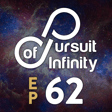Introduction to Parvati Marcus and Neem Karoli Baba
00:00:00
Speaker
Hello and welcome to Pursuit of Infinity, a podcast where we explore the depths of human consciousness and delve into the fascinating world of psychedelics. In this week's episode, we welcome Parvati Marcus to the show. Parvati was formerly known as Barbara, but given the name Parvati by the great saint and legendary guru, Neem Karoli Baba, commonly referred to as Maharaji.
00:00:23
Speaker
She is the author of the books Whisper in the Heart and Love Everyone and was a follower and close friend of Ramdas. Ever since her time in India with Neem Karoli Baba in 1971 and even prior to that, she's been propagating the enchantment of India's revered guru and the love and illumination he bestowed upon not just herself, but also Ramdas and the entire Satsang community.
00:00:46
Speaker
But before we get to it, as always, you can visit our website, PursuitOfInfinity.com, where you can not only listen to the podcast through our integrated media player, but find all of the places you can follow us as well. If you enjoy the podcast, please consider a sub, a 5-star rating, or even a review. These things play a crucial role in extending the reach of our discussions as widely as possible.
00:01:08
Speaker
If you're an avid listener and you want to show us some extra support, you can become a patron at patreon.com slash pursuit of infinity. You know, get some great stuff in return. So head on over there for the details. Give us a follow on Instagram at pursuit of infinity pod and keep up with news, episode drops, memes, and general musings.
00:01:28
Speaker
Also below, you'll find links to our discord server and our YouTube channel, which is youtube.com slash at pursuit of infinity. All of our episodes are always posted there in video format, as well as an array of shorts that we have been putting together on a regular basis. Now with all that out of the way, thank you so much for listening and I hope you enjoy this week's episode.
Parvati's Spiritual Transformation
00:02:04
Speaker
Hey, everyone. Welcome to Pursuit of Infinity. I'm your host, Josh, and today I'm joined by Parvati Marcus. Parvati, thank you so much for joining me today. It's a pleasure. I really appreciate it. Now, the name Parvati, that was given to you by the great saint Minkaroli Baba, AKA Maharaji, as you guys call him. That translates to like great king, right? A great saint.
00:02:26
Speaker
Maharaji, yeah, Maha is great and Raja is king. So it's great king. Yes. Yeah. So the first thing I'd like to ask you is who were you before Parvati? Tell me about Barbara.
00:02:40
Speaker
Well, I came to India as Barbara Bach and I left as Parvati Marcus. So it was an interesting journey. I thought it was a good upgrade. I mean, Barbara is barbarian or the stranger and Parvati is the wife of God. So I was quite pleased with the upgrade Maharaji gave me. Absolutely. How did you find yourself being called initially to go to India to see him?
00:03:08
Speaker
Well, by meeting a guy at a party in New Hampshire, and during the psychedelic days of 1969, and this guy saying, hey, you want to go meet a saint? And I said, sure, I've never met a saint. And the next day we drove up to New Hampshire to see Ramdas, who I had never heard of.
00:03:38
Speaker
That was it. I moved in a day later to Ramdas' thing that was happening in New Hampshire that summer. And that was where my life went in a completely different direction that it's been on ever since.
The Role of Psychedelics in Parvati's Journey
00:03:55
Speaker
Yeah. So how big of a role did psychedelics play in you finding your way to Ramdas?
00:04:04
Speaker
Oh, major. Three weeks before this guy asked me to go meet a saint, I had taken acid for the first time. It was interesting because I had been reading Timothy Leary's book, High Priest. It was the first time I ever heard the words cosmic consciousness.
00:04:27
Speaker
And it was sort of this revelation like, oh, that's what I've been looking for. Those are the words that describe what this yearning has been, so to speak. And so when I took acid for the first time, I went directly into that oneness. And as I came down from that trip, somebody handed me the Tibetan Book of the Dead.
00:04:53
Speaker
And as I read that over the next few days, it was like, yeah, yeah, yeah. It all seemed, uh, it all seemed right. It all seemed right. And then, uh, you know, we took it for the next two weeks. Yeah. Two weekends. And then suddenly I was, I was meeting Ramdas. So it was really like I had been given the acid so I would be awake enough to meet him.
00:05:22
Speaker
It was a very direct connection. So do you think that if your mind wasn't expanded by those experiences, you may not have been open to going to meet a saint? It would have been a saint. Are you kidding? They don't exist.
00:05:41
Speaker
Oh, and what version of the Tibetan Book of the Dead did you read? Was it the version that Ram Dass wrote? Oh, no, no. We're talking 1969. We're talking the original, you know, the Evan Wentz. The original. The original. Yeah. I mean, there were very few books around at that time you've got to realize. I mean, there was this sort of
00:06:04
Speaker
little library, shall we say, that all of us wound up reading at that time because they were the only books that were available at the time. Yeah, it was so much harder to find information on this path. We live in such amazing times now where there's a resurgence of this ancient wisdom and a dire need to connect with some of the wisdom traditions of the East.
00:06:32
Speaker
Back then, there was so little. There was Autobiography of a Yogi, which became a really important book for a lot of people. There was the Bhagavad Gita, but there was so little. Carlos Castaneda,
00:06:55
Speaker
So how did you first hear about Maharaji in general and what were your inclinations
Teachings and Presence of Neem Karoli Baba
00:07:01
Speaker
about him? What were your preconceived notions about just hearing from him from Ram Dass? Well, that's where basically the initial message was just seeing Ram Dass when we drove up the driveway to his house. And he was standing in front of the front door of the main house of his father's place in New Hampshire.
00:07:23
Speaker
And all I could see when I looked at him was light. I mean, I couldn't even speak. I hadn't dropped anything. I hadn't smoked anything. And all I could see coming from him was light. My mind was completely blown. So that was my introduction to Maharaji.
00:07:48
Speaker
Through Ram Dass, yes. It's similar to the book Whisper and the Heart, where you don't necessarily have to meet him in the flesh and the body. Right. Well, I actually met Maharaji before I went to India. I mean, because that summer, Ram Dass had given us these little black and white photos of Maharaji and our wooden New Hampshire wooden mollus. Excuse me.
00:08:16
Speaker
And after that summer, we all went our separate ways. It was getting a little cold there. And I had split a tab of acid with a friend of mine.
00:08:31
Speaker
when I got home, and was having a very intense trip. And the following day, I was still way up there somewhere. But people, I was feeling hands reaching up for help. Things were getting a little astrally strange. So I sat in front of this little picture of Maharaji, and I just kept saying, I'm scared, and you've got to help me. I'm scared, and you've got to help me. And the picture suddenly dissolved into blue light, and I could see him.
00:09:01
Speaker
moving and it was instantaneous. It didn't last more than a couple of seconds, but it was enough for me to know that he was there and that everything was okay and I could go through the rest of the trip and no problem. Well, needless to say, after that, I got a larger picture of Maharaji and I basically lived my life in front of it until I actually got to India and met him.
00:09:28
Speaker
And one of the first things he said to me was, you used to talk to my picture all the time. He said, you asked many questions. So I knew that you could connect with him without meeting his body, which is what made Whisper in the Heart such an easy book for me to do because I understood very much the reality of that possibility.
00:09:57
Speaker
Yeah, having had the experience yourself, and so many people have had the experience, way more people than I thought.
Impact of Westerners on Maharaji's Lifestyle
00:10:04
Speaker
And they're way more Westerners than I thought that went over to India to meet with Maharaji. And in your book, there is a specific description that you had made of the Indian people and how
00:10:23
Speaker
They were surprised by how much less nomadic Maharaji became when the Westerners came over to see him. Why do you think that was? Do you think he somehow intuited that you guys were going to come back here and spread the word?
00:10:38
Speaker
Well, intuitive is an interesting word to use for him. He just knew everything. He wasn't guessing. He knew what the program was. I would hate to assume anything in terms of what he thought.
00:11:03
Speaker
He needed to fill us up with as much as he could within a very short period of time because we didn't have 40 years with him like some of the Indians did. But the fact that he, for seven weeks in Kenshi when we first met him, didn't leave other than for a day here and there was remarkable to the Indians. Yeah.
00:11:29
Speaker
Yeah, so let's just talk about what it was like to be in his presence or as they say Darshan when you got to meet with him in the flesh. What was it like?
00:11:39
Speaker
It was extraordinary because none of us ever grow up with the experience of unconditional love. I mean, as much as our parents may love us or our partners may love us or whatever, it's never what real unconditional love is, which is the love everyone, right? When you were with Maharaji, you were sitting in the presence of love, of love as the energy of the universe.
00:12:08
Speaker
And I think Dr. Larry Brilliant said it really well. He was the one who said that while we were with Maharaji, he loved us. He said, but that was his job. He was a saint. He said the real miracle was that when we were in front of Maharaji, we loved everyone.
00:12:28
Speaker
Amazing, you know, what is that feeling what can you describe what it was like like what was different between? Like loving everyone when you were with him and then feeling the void of that when you weren't with him When
00:12:53
Speaker
Sitting in his presence, we were completely absorbed in his being, in that essence. I mean, nothing happened. I mean, he didn't give lectures. He didn't teach. There's a wonderful story, actually, that Rob Deb tells, one of the Westerners that was there.
00:13:17
Speaker
which is that here he was. He had a PhD in mathematics from Stanford. So he thought he was very smart. And here he is. He's sitting there in front of Maharaji. And Maharaji is having a conversation with one of the other Westerners about the price of skim milk in America. And Ramdev is sitting there going,
00:13:41
Speaker
I'm a smart person. What am I listening to this thing about the price of, you know, of milk in America? What difference does this make? I mean, it could be teaching us about all sorts of esoteric wisdom, right? And then it suddenly dawned on him, as he put it, or else Maharaji suddenly awakened him to the fact that it didn't matter what the words were.
00:14:07
Speaker
It didn't matter what was being talked about. What mattered was sitting in that energy that was there. And he went into a state of total bliss that lasted, he said, for many, many hours afterwards.
Ram Dass' Transformation and Spiritual Growth
00:14:20
Speaker
So it was sort of like on one level, you were sitting with this old man in a blanket, all right, who's just hanging out.
00:14:31
Speaker
talking about the price of skim milk in America or about, you know, I mean, every once in a while, of course, somebody would ask him a question like, okay, like, how should I meditate? And it was like, well, meditate like Jesus, you know, when he was on the cross, he loved everyone. Sure.
00:14:50
Speaker
But it was, so not being in his presence and not being held in that vat of love, I don't know how to describe it, it's much easier to slip into your mind, into your emotions, into your stuff.
00:15:15
Speaker
Yeah, that's a wonderful description. And I really feel it when I listen to lectures or I see anything that Ram Dass has ever done. You can really feel the light that he exudes. And I feel like it's got to be very similar, right? Yes. Well, yes, even more so.
00:15:37
Speaker
But it's almost like you can see the effect that Maharaja had on him, the degree to which just being in his presence changed around us. That's all it took, was being in his presence. He didn't have to hit you on the head and give you a name and give you a mantra or whatever. It was like just being in that presence.
00:16:03
Speaker
was enough to affect. I mean, at one point, the first day I was with him, the first Darshan I had with him, he reached over and he just very lightly, like with the fingertip, touched the top of my head, and I could feel every cell in my body rearrange.
00:16:22
Speaker
Wow. Yeah. Yeah. So for for people who might not be as familiar with the concept of a guru or might not be as open to accepting the potential, we'll call it magic that a person can embody. Right. Can you just sort of define what a guru is? Guru literally means the remover of darkness.
00:16:49
Speaker
And when you think about that term, the remover of darkness, what removes the darkness is the light. And the guru is the embodiment of that light, of that energy, of that thing. And there's a saying in India that God, guru and self are one. And so by
00:17:17
Speaker
being devoted to that guru, you are being devoted to that light that is within you as well. So it's
Receiving a Spiritual Name: Significance and Rebirth
00:17:29
Speaker
also a way of self-affirmation to have the reflection of the guru. Yeah. And is this what Ram Dass meant when after his stroke, he said he became closer to Maharaji?
00:17:46
Speaker
Yes, because a lot of the external activity had to die away. Half his body was paralyzed, he had trouble talking, all of that. But internally, he was able to spend more time, shall we say, hanging out with Maharaji.
00:18:09
Speaker
So yes. Yeah. And did you notice a difference in him? I mean, obviously there's a difference when, you know, someone goes from being fully functional to having an ailment like that. But did you notice any sort of a vibe or did you feel more light coming from him after his stroke? Because I think a lot of people said they did. Yeah, absolutely. There was a complete difference in what happened with Ram Dass before and after the stroke.
00:18:37
Speaker
He had to change, he had to go through that really difficult transition from being the person who took care of everybody else, you know, to the person who was taken care of by everybody else. So independence to dependency, all of that stuff throws you back into yourself, into who am I?
00:19:07
Speaker
if I am not the person I thought I was. And so it brought him a lot of humility and it opened him a lot to
00:19:21
Speaker
How do I say this? Like the more feminine aspects of caretaking. In other words, it was easier for a lot of women had had some trouble with rhombus. Let's put it that way. He was difficult. He preferred hanging out with the guys. Let's put it that way. And after the stroke, that changed. He became more open to... He just became more open.
00:19:52
Speaker
Yeah. And it seems maybe more open to like the maternal nature of being nurtured and being taken care of. Amazing. So let's go back to Maharaji a little bit and your story. Okay. So let's talk about the story of how he gave you your name. What happened with that?
00:20:14
Speaker
Actually, it was fairly close to the beginning of the time that we spent in Kenshi. I mean, some Westerners had met him earlier that previous spring, but then he had traveled
Experiences of Traveling in India
00:20:28
Speaker
a lot. At that time, he used to travel a lot. He'd be someplace three days and then disappear. Let me see if I can back up here a minute.
00:20:42
Speaker
Where are we going? I lost track. Just how he gave you your name. Oh, how he gave you my name. So in the beginning, who did he name first? I'd have to go back and actually look to see. But he started naming the women first. And the day he named me, he named, I think, three or four of us. Yeah.
00:21:13
Speaker
And then the meaning of the word of the name Parvati. Yes. And also receiving a new name. Yes. It's like when you become initiated into something, when you start a new life, receiving a new name sometimes is a symbol of that new life.
00:21:38
Speaker
And that very much is what it felt like. He was not only raising us vibrationally internally, but also by giving us a name that was of a much higher vibration than what we came in with, right? So, you know, Parvati, as I said, is the wife of Shiva.
00:22:00
Speaker
and literally means Parvat is mountain in Hindi, and Parvati is the daughter of the mountain. And in her case, the mountain is King Himavat, the Himalayas. So it was something that I could relate higher aspects to. It's a name to live up to.
00:22:25
Speaker
Yeah, it sounds like almost like the concept of a born-again Christian. It's like you're a born-again spiritual entity. Right. It's definitely being born again. You're given a new name. Yes. And it seems that within the Eastern cultures that death and rebirth concept is very, very important, very integral to Buddhism, to Hinduism. Right. So did that play a role in your spiritual practice? What? The name?
00:22:54
Speaker
The name and the concepts of death and rebirth, was that something that was brand new to you culturally and spiritually?
00:23:02
Speaker
Well, it was brand new to me at the point when I had first taken acid. But then I did as much reading as I possibly could. And certainly after reading The Tibetan Book of the Dead, which is a preparation, it takes you from the time that you're about to die through the state, the bardos that you go through after you die and into your next incarnation.
00:23:32
Speaker
It just was it was one of the bases of sort of the new life was that understanding. Yeah, definitely. Yeah. And I also I wanted to talk about the the journey there. I would assume in that time in the 60s and the 70s, it was probably much harder to get there than it is today. So what was the journey like?
00:23:59
Speaker
Well, that's why I included the journey in Love Everyone, how people got there, because it was an extraordinary journey. Literally, it was going halfway around the world, and you were there without communication with your old life. Some people did the old hippie trail.
00:24:27
Speaker
the treks that went through the bus ride that left from England and went through places you can't go anymore. They went through Afghanistan, they went through all sorts of incredible adventures on the way there. I took one of the last cheapo Arab charter flights from London to Bombay with seven stops.
00:24:55
Speaker
One of which was in Cairo. We had a seven-hour layover in Cairo ran out and saw the pyramids Amazing but literally it took it took I believe two and a half days to fly from London to Bombay
00:25:13
Speaker
And was that dangerous, especially as a woman traveling like that? Were you alone? I did not travel alone. I waited till there were a few other people from the meditation group I was in in New York who were ready to travel and traveled with them. I did not ever travel alone as a woman in India because it was not a good idea.
00:25:38
Speaker
Yeah, especially down at that time, I would say for sure. Right. I mean, there was a movie out at the time that sort of portrayed all the Western women as wearing, you know, short shorts and being very available. I see. Yeah. Yeah. That must have been the common misperception of women in America. Right. So it was...
00:26:03
Speaker
We dressed Indian. We dressed modestly. We took care. Yeah. What was it like because you were there, you lived there for quite a while, right? A year. Yeah, for a year. What was it like to live there day-to-day? It was incredible. I mean, I love India.
00:26:25
Speaker
We were with the Indians that we met around Maharaja, the Indian families, the Indian devotees who had been with him for 40 years were just incredible people and became real family. I really don't have a desire to go back to India because most of the people I know are gone.
Self-reflection in Maharaji's Presence
00:26:53
Speaker
But back then, it was really extraordinary. I felt like we were just moving from sort of love boat to love boat. We met a lot of remarkable people.
00:27:11
Speaker
When I listen to the stories, everyone just seems so generous giving you food. And I mean, it feels like if I were to go there at that time and step into your shoes, I feel like I would feel like undeserving. Did you guys ever feel any of that? Well, unworthiness is just part of the pot of
00:27:35
Speaker
The thing is, when you're in front of such a bright light as Maharaji, the light is so bright that anything within you, any sort of negativity within you seems much bigger and darker.
00:27:54
Speaker
It's like the shadow it casts in the bright light is so much bigger that so many times you'd find one or the other of us down by the river crying because we were so filled with guilt or shame or unworthiness or whatever.
00:28:13
Speaker
People would think, oh, aren't you in bliss all the time being around Maharaji? It was no, it wasn't always bliss because we had to deal with our own stuff. When the guru is removing the darkness, you have to first see the darkness.
00:28:34
Speaker
So did you guys have any practices or did he show you anything or have you go see anyone that would help you to dispel some of that darkness that hung around? The only person he ever sent us to see was Ananda Maima. So what did you guys do when you saw him? Her.
00:28:57
Speaker
Yes, Anandamayi Ma. Ma is the female Baba, the version of Baba. And she was a very incredible Indian saint, actually. And so basically, they were friends, Maharaji and Anandamayi Ma.
00:29:18
Speaker
in whatever level you call those kinds of friendships, Saint to Saint. And we would come back from seeing her and he would go, did she feed you? Did Ma feed you? Did she take care of you? No, he did not teach us lessons. He did not give us practices. He did give people mantra, if they asked.
00:29:45
Speaker
But it was not like a formal ceremony type of thing. There was no formality with him. Other Indian gurus would have women sitting on one side and men on the other and follow all the Brahman rules and do all the, not Maharaji. He was beyond all form, all rules, all any of that.
00:30:14
Speaker
So it was strictly being in the presence of pure compassion and unconditional love that taught you all you needed to know. Absolutely. Absolutely. Because it
The Community of Seekers: Satsang
00:30:29
Speaker
wasn't lessons that you had to learn. I mean, it was all happening from within. And it was all very subtle. In other words, Maharaji could be doing something with you that other people would have absolutely no idea what was going on. I mean, for example,
00:30:45
Speaker
these two friends of mine, who were married at the time, had a big fight one day. And then they came to see Maharaji. And she had had some toast that morning that, or something where something wasn't right, something was burnt, something was whatever. But then they had this big fight and then they went to see Maharaji. And Maharaji looked at her and he said something about,
00:31:14
Speaker
You didn't eat the burnt toast. Didn't mention the fight, but you knew he knew about it if he knew about the burnt toast. It was that kind of thing. Like, yeah, you know. So he had a lot of humor to him. A lot. We laughed a lot with him. He really, uh, he was amazingly funny and, and.
00:31:39
Speaker
Fascinating. I mean, when we sat there, it was like you couldn't close your eyes and meditate. You just watched him. You just watched him moving or talking, and it was enough. It was like watching the best TV show ever. That's a pretty cool analogy I like that.
00:32:04
Speaker
And we talk about the groups of people who are around him, the Westerners coming over. And as I understand, that's referred to as a satsang. But for anyone who doesn't understand that or has never heard that term before, can you describe that for us? Yeah, satsang is the Hindu way of saying the Buddhists call it sangha. It's the same thing. It's the community of seekers. It's the community of those on the path.
00:32:34
Speaker
So in general, we're Sangha, we're Satsang because we're talking about that. Then there's like a specific, you know, the Maharaji Satsang or, you know, the, you know, the Vipassana Sangha. You know, it's sort of like your community of fellow seekers. And
Adapting Spiritual Practices in Western Life
00:32:56
Speaker
this was a pretty common kind of structural thing with a lot of gurus.
00:33:00
Speaker
Well, it's just the way it happens naturally. The Buddha, the three main supports of life is the Buddha, the Dharma, and the Sangha. In other words, there is the embodiment of it. There is the way to live to be that, which is the Dharma.
00:33:27
Speaker
And then there's the Sangha, which is your community along the way, your community on the path. Yeah. Yeah. So one of the main questions that always permeates my mind when I hear about the absolute beauty and just the amazing experience it must have been to be in Darshan with Maharaji is
00:33:50
Speaker
When you feel that and as you were describing when your darkness comes up and erupts and sort of bubbles up to the forefront and then your year ends and you have to come back to America, how do you square these two things? How do you come back into a society with so many sicknesses just burning throughout it when you've just been in the presence of pure love?
00:34:15
Speaker
Well, you hold on tight. When we came back, we literally holed up on what was my husband's father's farm at the time up in Canada. A whole bunch of us that had all left India at the same time all got together and lived there together, at least until winter came and people couldn't live in tents anymore out in the
00:34:45
Speaker
in the cold in Canada, and very gradually found our way back into, quote, the world. But in the beginning, it was sort of like you just wanted to hold on tight and not let anything sully the experience. I mean, I remember my mother-in-law giving me a gift of this beautiful pair of leather gloves, and I was horrified. Leather! Oh, my God, I can't touch leather, you know?
00:35:15
Speaker
I think that's how it started, that we wanted to maintain that connection. That's how the group Amazing Grace started and did this Love, Serve, Remember album. All these things started to happen.
00:35:39
Speaker
you know, gathering Maharaji stories to put into a book, doing, you know, starting to, you know, sort of collect and hold on to as much as we could. Yeah. And to share. Yeah. It seems like everyone, all the Westerners who were over there really came back with the desire to share what they experienced. Well, it was extraordinary. You know, it was really not everybody. There are people who really went into
00:36:12
Speaker
It went into a cave, so to speak. But for most of us, yeah, there was some way in which it needed to be shared through whatever that individual's perspective was. I mean, Danny Goldman, who then wrote emotional intelligence. So he was taking it through the psychology realm that he knew. Krishna Das, of course, eventually took it into music.
00:36:43
Speaker
Yeah, yeah, it's amazing. Now that you bring that up, it's like, yeah, everyone sort of had their own path. And then I allowed Maharaji to work for them. I did to come through that path. Exactly. Yeah. Amazing. Yeah. And your path, he called you his secretary, right? Yes. That's amazing.
00:37:02
Speaker
Well, what had happened is when I had met Ram Dass at summer of 69, three days after I moved in, he said, can anybody hear tight? And I raised my hand. And I became his secretary for the summer because he was answering a lot of snail mail. Remember that back in those days? So when I came to India, Maharaji said, you used to be Ram Dass' secretary. Now you're mine.
00:37:33
Speaker
And in English, he used to say, private secretary, private secretary. Amazing. Yeah, because he had a translator. You guys would speak through his translator, correct? Yes. Eventually, some people did learn to speak enough Hindi to know what he was saying. But yeah, for most of us, it was through a translator. And then every once in a while, he'd throw in something in English just to throw you off.
00:38:01
Speaker
So someone like like Maharaji born a saint, do you believe? Like as a baby, as a child, what was his life like? Was he always sort of like this mystical being? We knew nothing about his previous life when we were with him. It was only after after he left his body.
00:38:23
Speaker
actually, that we learned that he had been married when he was, what, nine or 10 years old, or given in marriage at that age, shall we say, and that he had four children. And we didn't know any of that when we were with him. And the people that were in his village, where he was the head man of the village and where he always showed up whenever his kids needed anything or his wife needed anything, they had no idea who he was.
00:38:52
Speaker
as a guru. So even when he was with you guys, he was still taking care of his family and living up to all those responsibilities.
00:39:01
Speaker
Right. But we knew nothing about it. Yeah. Wow.
Mystical Stories of Maharaji
00:39:04
Speaker
Yeah. And as you guys had said, a lot of people had said, actually, when they would be over there in India was he would almost be in two places at once, it would seem. And there are some really interesting stories about him. Literally. Yeah, literally. There was one that I think is pretty popular where he was it took place in a barbershop, right, where he was given somebody or somebody was getting
00:39:26
Speaker
like a haircut or something like that. And they were told that their son needed needed them for something. And I think the guy then traveled to wherever his son was. And I don't know. I'm not sure of the details, but apparently it was Maharaji that was informing him that he needed to go see his son, which is. And this was, you know, halfway across the world. Right. Yeah. Interesting stuff. There are some very wild stories.
00:39:56
Speaker
Yeah, but having experienced some of those wild stories, I can tell you they're undoubtedly true. Yeah. Speaking of a wild story, there was one that really stuck out to me. I believe it was a nine year old boy who was suffering from abuse. Can you tell that story, please? That's from Whisper in the Heart, right? Yes. Yeah. Yeah, this is an extraordinary tale. I mean, here's this nine year old boy who had been through years of
00:40:22
Speaker
intense sexual abuse with groups of men. I mean, they're talking, you know, nasty stuff. And he comes home from school one day, and he was the youngest, and he was home first. The others were still in school. His parents were at work. And he sees that, like, the front door of the house is, like, blown open, and the window is upstairs. It's blown open. And, like, a bomb went off in the house. And it's getting dark. This is in Australia, by the way.
00:40:50
Speaker
This takes place in Australia. And he's terrified. He doesn't know what's going on. And this gentleman comes over and puts a blanket around him and just basically says, it's going to be all right. And that's all he remembers. He sort of fogs out about what happened after that. 25 years later,
00:41:18
Speaker
He had been married more than 25 years later. He had two teenage sons and finally gets divorced from an abusive woman. He naturally winds up in an abusive marriage because that's what he knows. He finds himself out on the balcony one day of this high rise that he's moved to with the mountains on one side, the oceans on the other. He finds himself with one leg over the balcony and about to go over
00:41:48
Speaker
and jump. And he suddenly hears this voice saying, you are loved, you are loved. And this big wave of love comes towards him and he goes, Oh, what about the boys? You know, and he comes back. And many years later, he's in the States with
00:42:11
Speaker
And he sees either a book cover or a magazine article, something or another, that has a picture of Maraghi. And he goes, oh my God, that's the blanket that was put around me. And then he looks at the man wearing the blanket and he goes, and that's the man who gave me the blanket. He says, I'll never forget that date. He goes, it was September 9th, 1973.
00:42:38
Speaker
September 11. Sorry, 911. September 11 1973. And I go, Oh my god, that's the day Maharaji left his body. He didn't know that. Wow. What do you make of a story like that? How do you how does the Western mind comprehend that?
00:43:01
Speaker
Who knows? I mean, it's beyond the mind. It's just completely beyond the mind. That's what Westerners have to understand that there are some realities that are simply beyond the mind. You're never going to know. Yeah, that's our
Benares: Sacred City and Spiritual Significance
00:43:19
Speaker
problem, right? One of our many problems. That's why it's called the great mystery.
00:43:26
Speaker
And luckily psychedelics have been coming back. There's a giant resurgence of them and I think that they're very important for people like us who don't really have any cultural roots in any wisdom tradition so that we can be broken out of our paradigms.
00:43:45
Speaker
And you know, for me, if it wasn't for psychedelics, I wouldn't have been traveling down this path. I would not know who Maharaji is. I wouldn't know who you are, Ramdas. And I think psychedelics are just, they're so important for that. And it seems like a lot of people have traveled to India and have traveled down the path of the East as a result of their experiences from these substances. Absolutely. Yeah.
00:44:12
Speaker
Maharaji was fine with acid. He called it the yogi medicine. As a matter of fact, he told Raghu when his father came over, he says, give your father the yogi medicine. That's an incredible story too. I heard Raghu tell that story about going through Benares with his father on acid. We were with him on the boat.
00:44:38
Speaker
waiting. I mean, here Maharaji told him to take acid, you know, we expected like instant enlightenment or something. I mean, talk about a lesson in expectation. But it was sort of old acid. And what it did was it just gave him enough opening as we walked around Benares and saw, you know, a dead cow and a dead person and saw cremation and had the sort of encounter with death that he was able to open up to it because he had had just enough
00:45:08
Speaker
of the acid. Can you talk a little bit about the significance of Benares for anyone who doesn't understand or isn't familiar? Benares I believe is the oldest sacred city on earth. It's been sacred to Shiva, to Lord Shiva for
00:45:30
Speaker
many, many, many thousands of years, and probably looks exactly the same as it did then. It's on the Gunga. It's on a place along the river that was always felt to be very pure, even though the water in the Gunga is, as we know, not what you would call clinically clean.
00:45:59
Speaker
and a place where people would come to die because Lord Shiva would whisper Ram Ram in their ear as they were dying and would liberate them that way. It was sort of the final place to come for liberation.
00:46:18
Speaker
So when you would go there, you would be confronted with a lot of death and a lot of unfiltered death, right? Well, yes, because if you've never seen a cremation, I mean, here, you know, a body is in a cardboard box and shoved into a tube into an oven and you don't see what's going on.
00:46:41
Speaker
In Vanaris, they would be piling up the wood and laying out the body and piling more wood on top and lighting it. And around the pyre, you know, there'd be kids playing and animals doing their thing and whatever. And it was just a normal part of life was seeing death. Yeah.
00:47:04
Speaker
I mean, there would be a lot of people who came to die, and so they would come with just enough money to buy the wood needed for their fire. Or they would die on a street and people would start putting rupees or coins there to collect the money to put them, to burn them.
Maharaji's Teachings Through Paradoxes
00:47:25
Speaker
the mood or the vibe or the atmosphere of the people who were going there to die? Were they going there peacefully? Were they going there and feeling sort of a pride because they were going there with the intention of having a beautiful ceremonial death, so to speak? Or was it still sort of like a sketchy situation? No, it was devotional.
00:47:47
Speaker
It was really devotional. It was people who had lived their lives within a system of belief that said that if you come to Benorahs to die here, you will be liberated. They were people that would be seeking to have that freedom, to have that release.
00:48:12
Speaker
Did Maharaji ever talk about death or sort of try to inform the Westerners, kind of, or maybe sway their idea of what death was? Because I'm sure he understood that we have a very skewed perspective of what death is. As I said, he didn't teach. There were no lessons on death, other than, you know,
00:48:38
Speaker
things that were completely, could be completely confusing. I mean, he could say black one day and white the next day about the same thing. I mean, he wasn't stuck on any one point of anything. If that makes sense. Like a living paradox or something. Right. I mean, for example, there are stories of somebody coming to him and saying, you know, one of your old devotees has just died and he wept.
00:49:08
Speaker
You know, tears coming down. Another time somebody came and said, you know, so-and-so has died. And he started laughing. And it was like, what are you? A butcher? I mean, why are you laughing at this person's death? And it was like, he said, why? Should I be one of the puppets?
00:49:30
Speaker
Yep, there's the humor again. So it seems like there's this strange paradox between like everything he said and did was calculated, but he was still here now in the moment and not living in the future or the past.
00:49:46
Speaker
Yeah, calculated is a bad word. It sounds like there's intent to make things happen a certain way, you know, whereas I think he was just so in the moment and everything in that moment was available to him, whether it was the past or the future or whatever. And whatever the optimum thing was for that moment was what he did. That was, yeah.
00:50:15
Speaker
Ramdas had talked about that when he told the story about how he gave Maharaji acid. He said that essentially Maharaji was already living there all the time and had access to those realms. So it wasn't really anything new to him. Right. Yeah. Amazing. Yeah. Yeah. He said Yogis knew about this thousands of years ago.
00:50:43
Speaker
So can you talk about, let's just say, what's one of the most impactful stories that you could tell about being with Maharaji? Would you be able to tell that for us?
00:50:57
Speaker
Um, well, it's funny because it seemed like a little thing at the time, but it's something that has left a very large imprint on me, so to speak. And I think I wrote about it and whisper in the heart, which was that, um, when I was in India, I was smoking beaties. Beaties are these terrible little cigarettes. It's a tiny bit of low grade tobacco wrapped in a beetle leaf and they're awful, but.
00:51:23
Speaker
That's the way it was. I was smoking them anyway, but I wanted to stop. I had basically started smoking them to hang out socially. And then I really wanted to stop, but I was sort of, you know, getting addicted to them. And I came in one day to see Maharaji and Maharaji looked at me and he said, stop smoking beaties.
00:51:47
Speaker
Okay. So I gave away my pack of beaties and after lunch, he called me back up to congratulate me on the fact that I had stopped smoking beaties. And he said, I'm the CID of the heart. The CID is the Indian equivalent of the CIA. And that line, I'm the CID of the, he knew that in my heart I wanted to stop. So he told me to stop.
00:52:15
Speaker
But the fact that that line, I'm the CID of the heart, that he knows what's in your heart had a very big impact.
Fusion of Technology and Spiritual Wisdom
00:52:26
Speaker
Yeah. Amazing. Yeah.
00:52:28
Speaker
I wanted to ask you about, as we're beginning to wrap up here, because we're approaching an hour and I do want to be respectful of your time. There's a lot of stuff in the news nowadays about UFOs, UAP, all these extraterrestrial non-human entity or non-human intelligence type of things. And we talk a lot about that as well as psychedelics and esoteric stuff on this podcast. A lot of our episodes recently have been about this phenomenon.
00:52:57
Speaker
Was there any indication as to how a great saint like Maharaji would feel about this type of topic? Or do they have any sort of insight within Hindu wisdom about this type of thing? Well, he certainly never discussed it as far as I know. I don't think Maharaji ever mentioned UFOs or aliens or whatever.
00:53:23
Speaker
But then again, you know, this is a multidimensional being, you know, and whatever plane of consciousness, other beings from other planets, from other galaxies, from other whatever might have, he would be able to be in touch with that. So, but did that mean he said anything about it? No.
00:53:49
Speaker
Because one of my main interests in this world, one of the things that really gets me going is the merging of these two opposite facets of reality and of life. This path that we're on here in Western capitalistic society where we're being guided by materialism but
00:54:13
Speaker
Underneath that is a foundation of technological innovation, the need to continuously evolve our intelligence as opposed to our wisdom, and then the other side of that, which is the spiritual life.
00:54:29
Speaker
the traditions of shamanism, Hinduism, Buddhism, all of these other aspects of reality. My concern is that I feel like humanity needs to merge these two things to become what we're destined to be.
00:54:46
Speaker
And I always just search through these wisdom traditions and through anybody who has the knowledge as to any type of way we can do that. To me, it's just super important that we merge these two things. And for us in Western culture, we are missing so, so much of that spiritual side. So in your opinion, what can we do? What should we do?
00:55:10
Speaker
because for me personally, I'm not sure if you've ever heard the phrase FOMO. Have you ever heard of this phrase before? I just heard it from Pete Holmes, was the one who finally told me what it was. Of course, it sounds about right coming from him. But I mean, this is something that I have
00:55:28
Speaker
just a dramatic FOMO in terms of not being able to meet some of these people, Ram Dass and Maharaji. So what do you say to people like me who are really seeking to merge these two facets of reality but do have that FOMO feeling? Well, no, I don't have it at all because I was there.
00:55:55
Speaker
But it's all within. I mean, if God, Guru and Self are one, and you are seeking that being that removes the darkness from within you, look within. Look at the darkness until the darkness turns into light. I mean, you know, there are so many ways to work. There are so many different pathways to take into knowledge of the capital S Self.
00:56:25
Speaker
There are so many ways to do that. And as you can see and whisper in the heart, which are all stories of people who quote, met Maharaji since he left his body. So it's like none of that happened on the physical plane. And so people think, oh, I must be nuts to have an experience like this.
00:56:53
Speaker
And then they find out all these other people have had those experiences as well. So, hey, you know what? Maybe these things that happen beyond the physical plane or below it or beneath it or next to it or wherever it is, interwoven within it, is real. Westerners get stuck on the physical plane. And that includes the brain, the knowledge.
00:57:22
Speaker
Not wisdom. Yeah. Because wisdom
Parvati's Current Projects and Maharaji's Influence
00:57:25
Speaker
is from the heart. Wisdom's from the heart, right? Yeah. But there's so many ways to work, you know, that that's what there is a lot of now, as there are a lot of teachers out there who can show you a way to start tipping away at the darkness and letting more light in. Yeah. And, you know, you learn as much as you can from that one. And when you've had enough,
00:57:51
Speaker
You wait for the next messenger to show up, you know? Absolutely, yes. Parvati, I really, really appreciate this conversation. Thank you so much for all of your wisdom and for sharing all of your stories. I really, really appreciate it. Thank you. And as we begin to wrap up here, do you have any links, any places people can find you, anything you want to share, any events, anything like that coming up? Well, let's see.
00:58:19
Speaker
Love Everyone is the book that is the stories of the Westerners who actually went to India and met Maharaji. And Whisper in the Heart, as I said, are the stories of those who have met him since he left his body and never met him, quote, in person, except for a few who did. And then I have another book called Isabella Castas Bella. It's a happy little witch and her friends.
00:58:48
Speaker
which is in the process of getting developed as an animated TV series. So that's sort of where I've been putting my energy right now, is that. And in working with a lot of people who are doing their memoirs at this stage of life, you know, because a lot of us who are with Maharaji are now in our 70s and 80s, and it's time for them to
00:59:12
Speaker
tell their stories. So I have been working with quite a number of people who are with Maharaji who are now telling their stories and their books will be out. Amazing. Well, thank you for sharing. Thank you for bringing all the wisdom that you've brought back and just continuing along the path and continuing to share what Maharaji had to say and had to show. Well, thank you. It's always a pleasure to talk about.




















